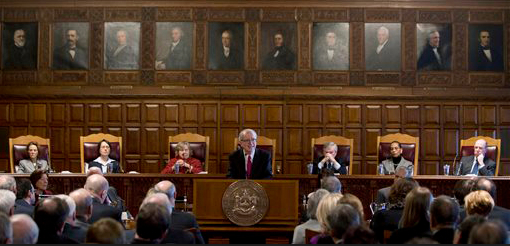New York chief judge proposes major grand jury reforms

ALBANY— Major grand jury reforms proposed Tuesday by New York’s chief judge include releasing records of closed-door proceedings when nobody is charged and direct judicial oversight when police are investigated for killings or serious assaults.
Chief Judge Jonathan Lippman’s proposed legislation follows protests last year after grand juries declined to indict police officers — one seen on video choking an unarmed Staten Island man who died and another who fatally shot an unarmed suspect in Missouri.
“Of immediate concern are the perceptions of some that prosecutors’ offices, which work so closely with the police as they must and should, are unable to objectively present to the grand jury cases arising out of police-civilian encounters,” Lippman told a courtroom full of jurists and lawyers in his Law Day address Tuesday. “To me, it is obvious that we need significant change in grand jury practices and protocols in the world we live in today.”
